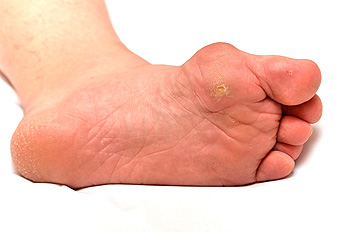Overview of Plantar Warts
Monday, 05 August 2019 00:00 Plantar warts develop on the bottom of the foot. They are caused by human papilloma virus, better known as HPV. If you believe you have developed a plantar wart, refrain from picking at it as the virus can be spread through touch and scratch. While anyone is prone to developing these types of warts, they most typically affect children, teens, and young adults. When in your body, HPV sets off the multiplication of epidermal cells that leads to the formation of warts on the feet. Plantar warts tend to develop on the heel or weight-bearing parts of soles. They will often grow inward, exposing sensitive tissue and triggering pain and bleeding. If the wart is small and non-intrusive, it can be treated through home remedies such as over-the-counter (OTC) treatments. Most OTC treatments contain salicylic acid and are applied topically to the wart. If the wart is bigger in size, in-office procedures may deliver faster and safer results. The in-office treatments include cryotherapy, immunotherapy and regular surgery. Plantar warts can be prevented best by covering your feet in places where people walk barefoot and changing your shoes and socks regularly to avoid the spread of the virus. Washing and drying the feet thoroughly with the use of talcum powder to help absorb excess moisture and perspiration is also a prevention recommendation. If you are developing plantar warts, it is important to see a podiatrist for the best treatment option.
Plantar warts develop on the bottom of the foot. They are caused by human papilloma virus, better known as HPV. If you believe you have developed a plantar wart, refrain from picking at it as the virus can be spread through touch and scratch. While anyone is prone to developing these types of warts, they most typically affect children, teens, and young adults. When in your body, HPV sets off the multiplication of epidermal cells that leads to the formation of warts on the feet. Plantar warts tend to develop on the heel or weight-bearing parts of soles. They will often grow inward, exposing sensitive tissue and triggering pain and bleeding. If the wart is small and non-intrusive, it can be treated through home remedies such as over-the-counter (OTC) treatments. Most OTC treatments contain salicylic acid and are applied topically to the wart. If the wart is bigger in size, in-office procedures may deliver faster and safer results. The in-office treatments include cryotherapy, immunotherapy and regular surgery. Plantar warts can be prevented best by covering your feet in places where people walk barefoot and changing your shoes and socks regularly to avoid the spread of the virus. Washing and drying the feet thoroughly with the use of talcum powder to help absorb excess moisture and perspiration is also a prevention recommendation. If you are developing plantar warts, it is important to see a podiatrist for the best treatment option.
Plantar warts can be very uncomfortable. If you need your feet checked, contact one of our podiatrists from Family Foot Care. Our doctors will assist you with all of your foot and ankle needs.
About Plantar Warts
Plantar warts are the result of HPV, or human papillomavirus, getting into open wounds on the feet. They are mostly found on the heels or balls of the feet.
While plantar warts are generally harmless, those experiencing excessive pain or those suffering from diabetes or a compromised immune system require immediate medical care. Plantar warts are easily diagnosed, usually through scraping off a bit of rough skin or by getting a biopsy.
Symptoms
- Lesions on the bottom of your feet, usually rough and grainy
- Hard or thick callused spots
- Wart seeds, which are small clotted blood vessels that look like little black spots
- Pain, discomfort, or tenderness of your feet when walking or standing
Treatment
- Freezing
- Electric tool removal
- Laser Treatment
- Topical Creams (prescription only)
- Over-the-counter medications
To help prevent developing plantar warts, avoid walking barefoot over abrasive surfaces that can cause cuts or wounds for HPV to get into. Avoiding direct contact with other warts, as well as not picking or rubbing existing warts, can help prevent the further spread of plantar warts. However, if you think you have developed plantar warts, speak to your podiatrist. He or she can diagnose the warts on your feet and recommend the appropriate treatment options.
If you have any questions please feel free to contact our offices located in Valatie and Albany, NY . We offer the newest diagnostic and treatment technologies for all your foot and ankle needs.



